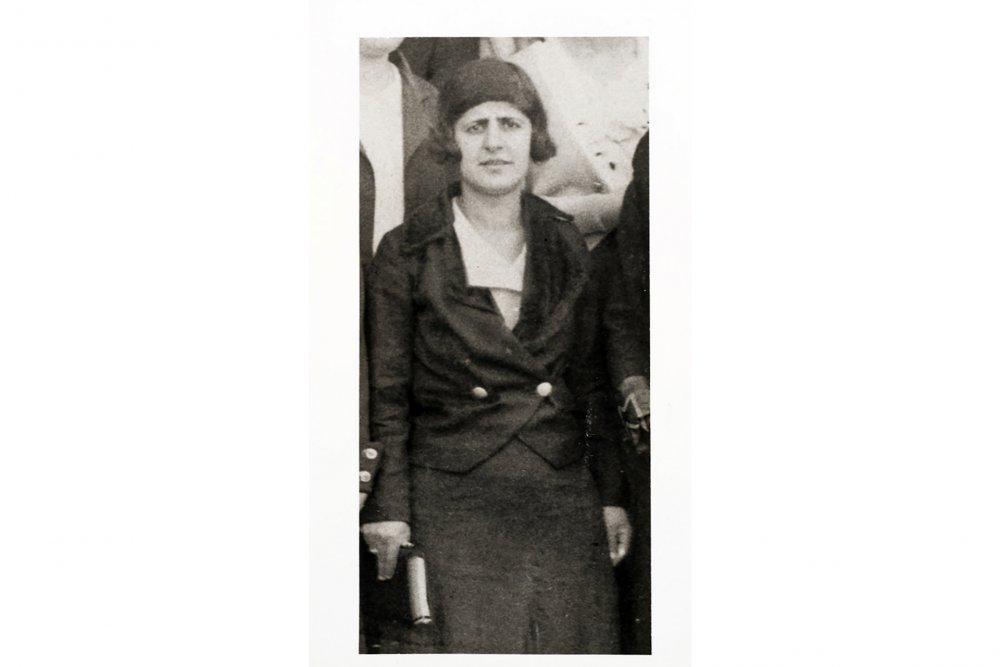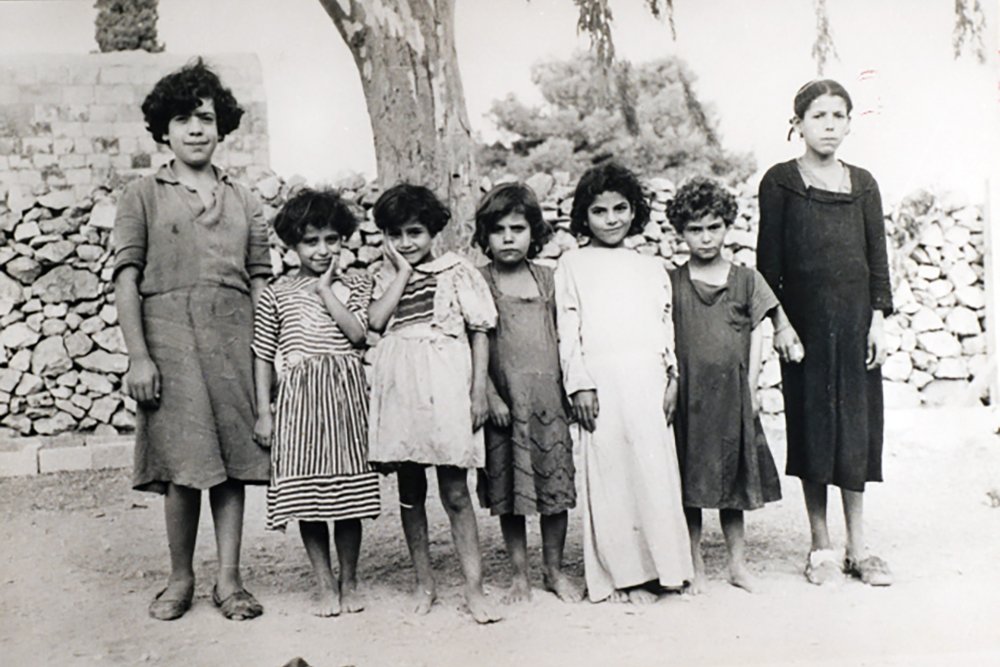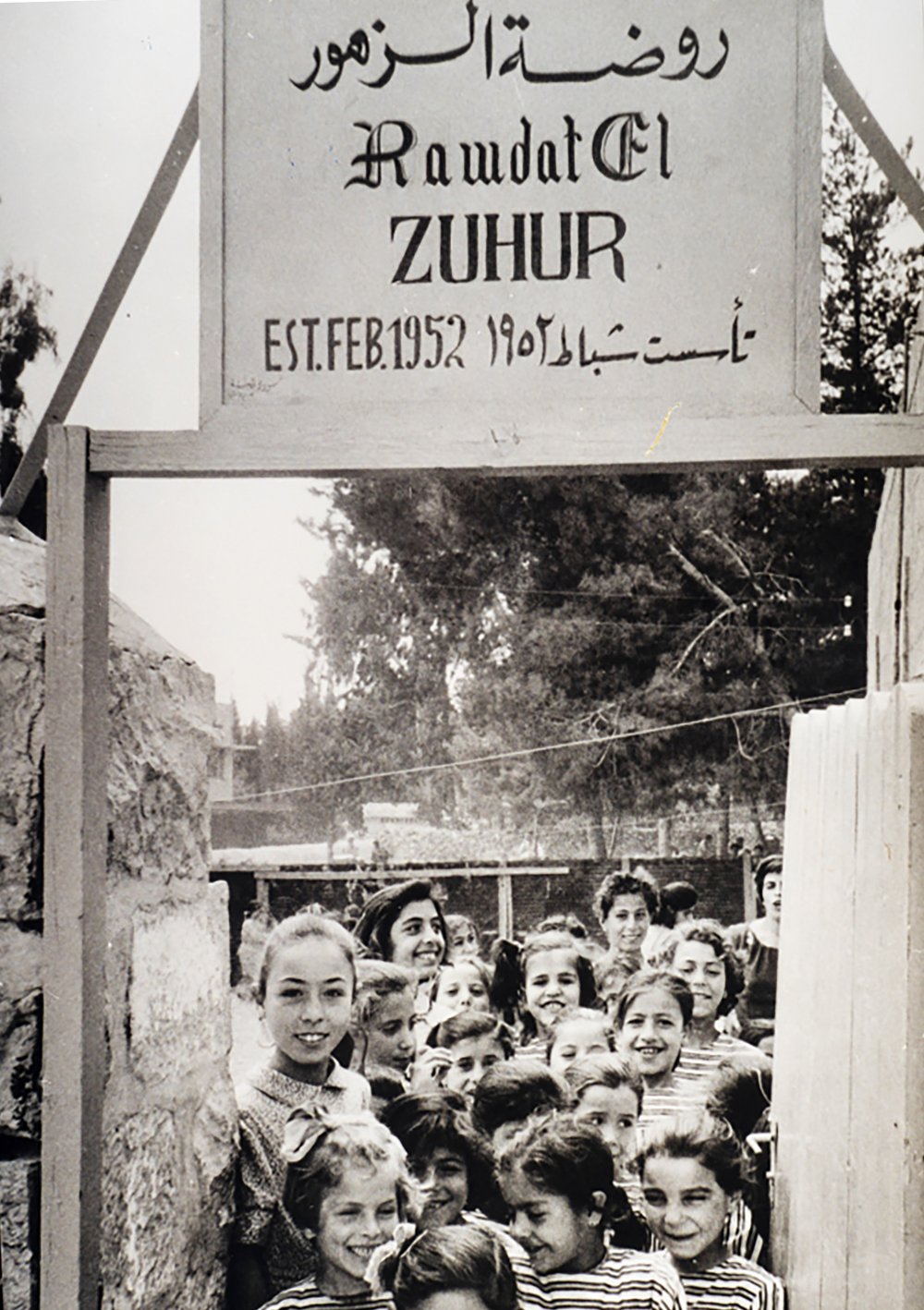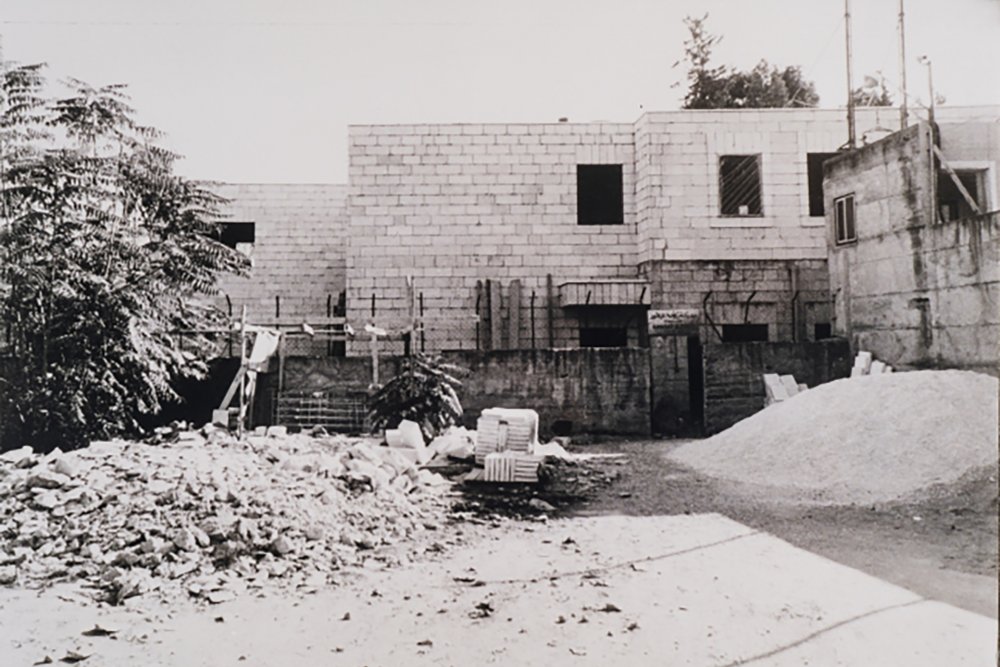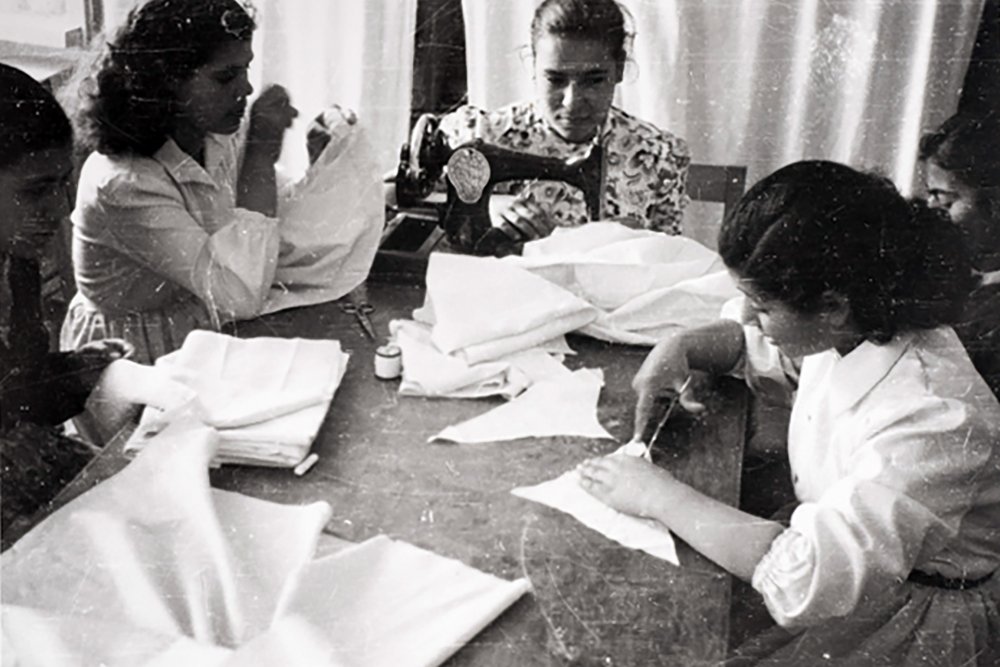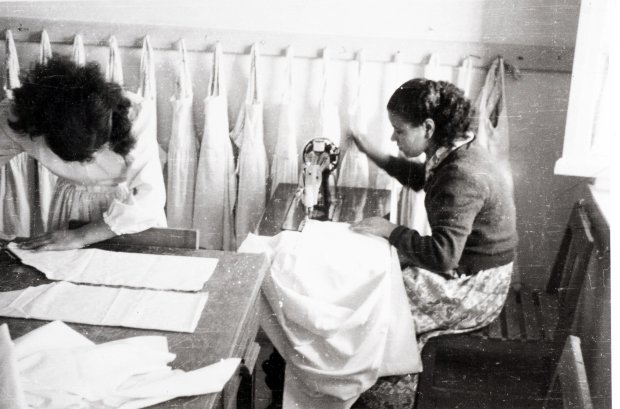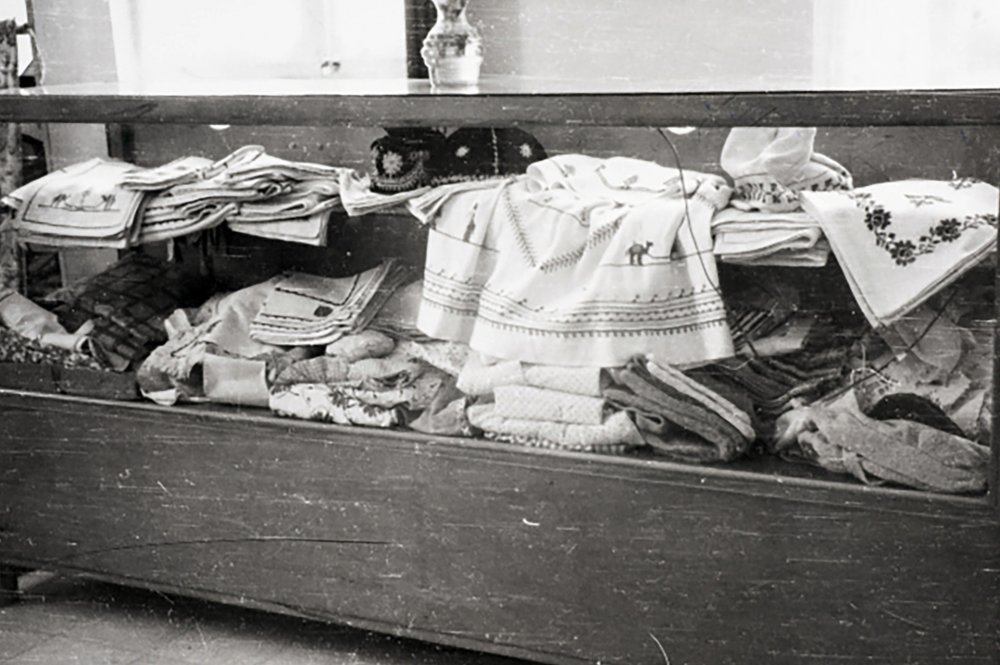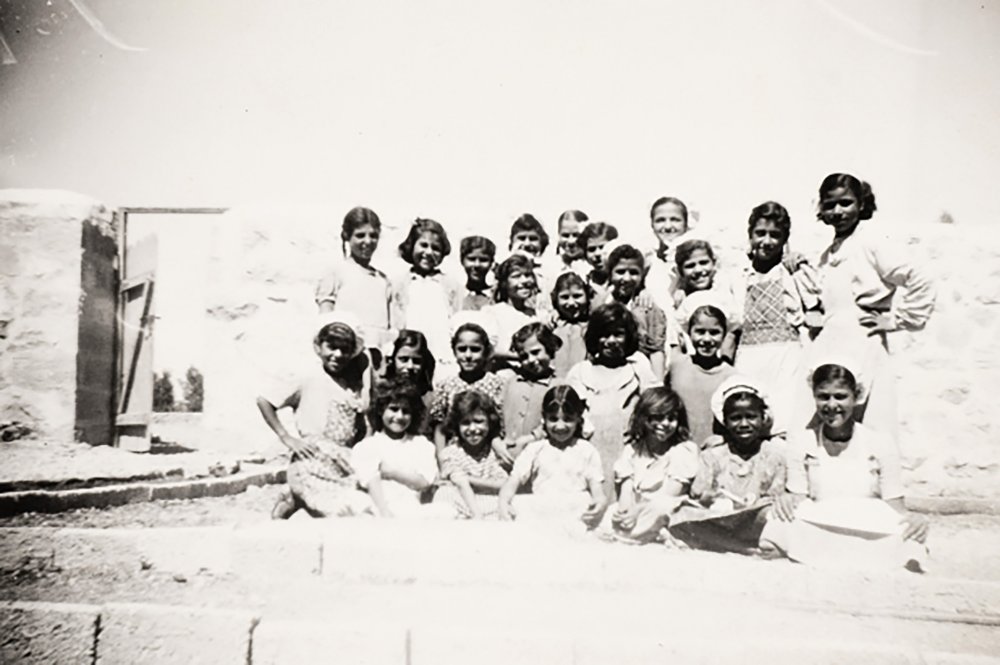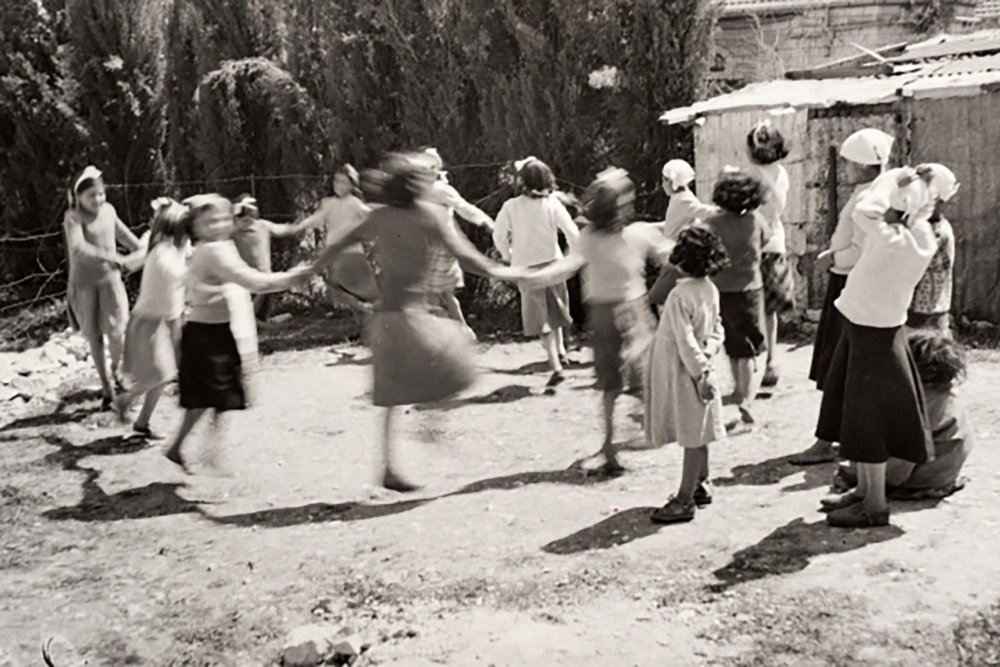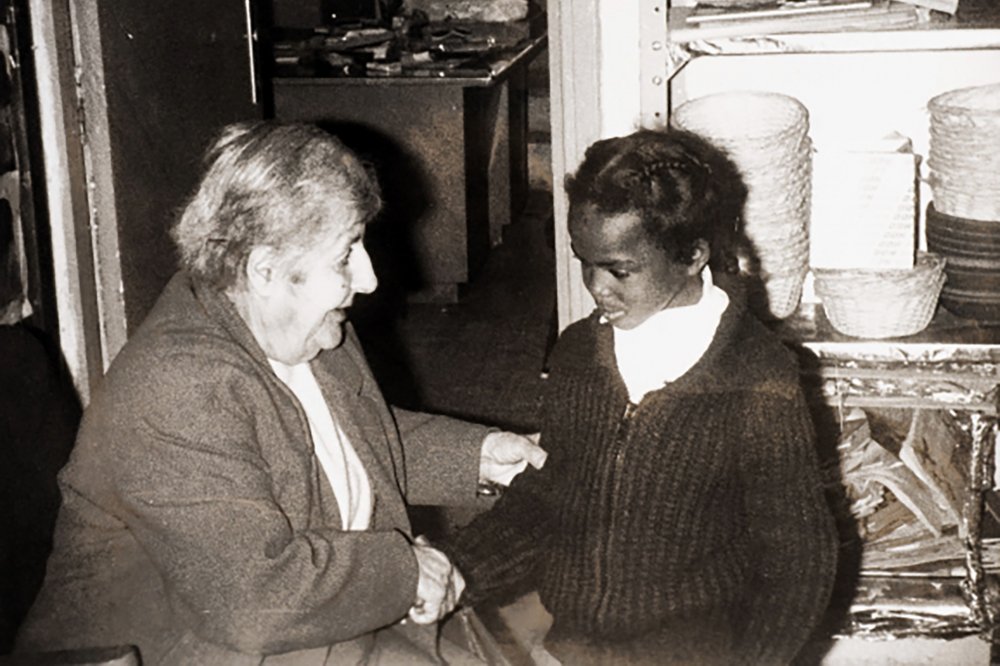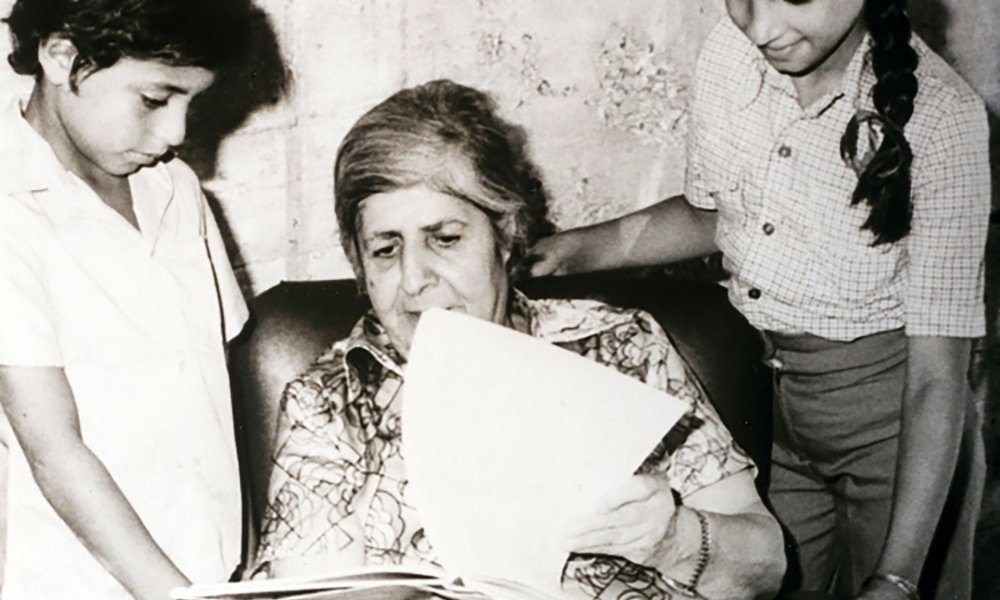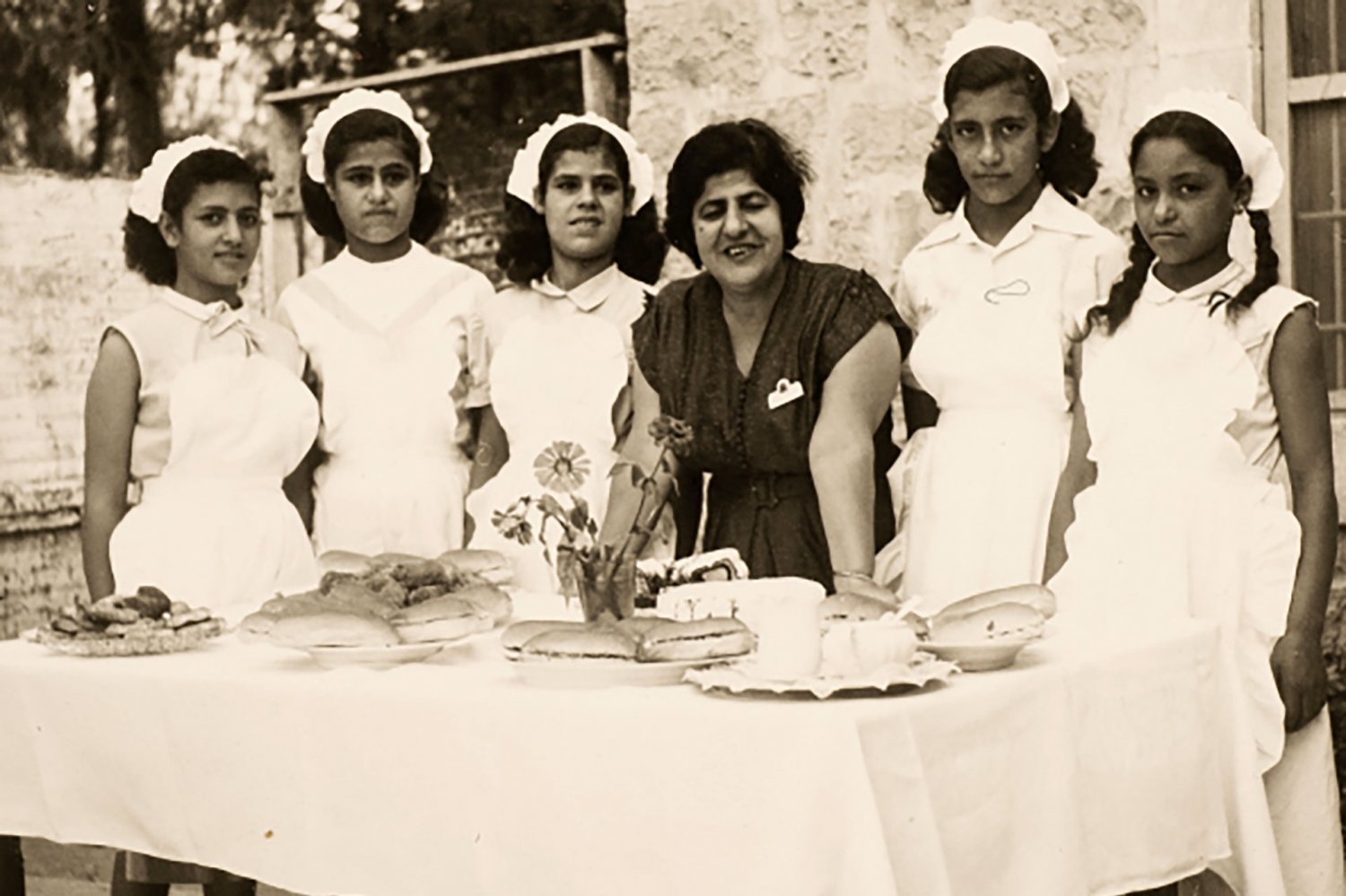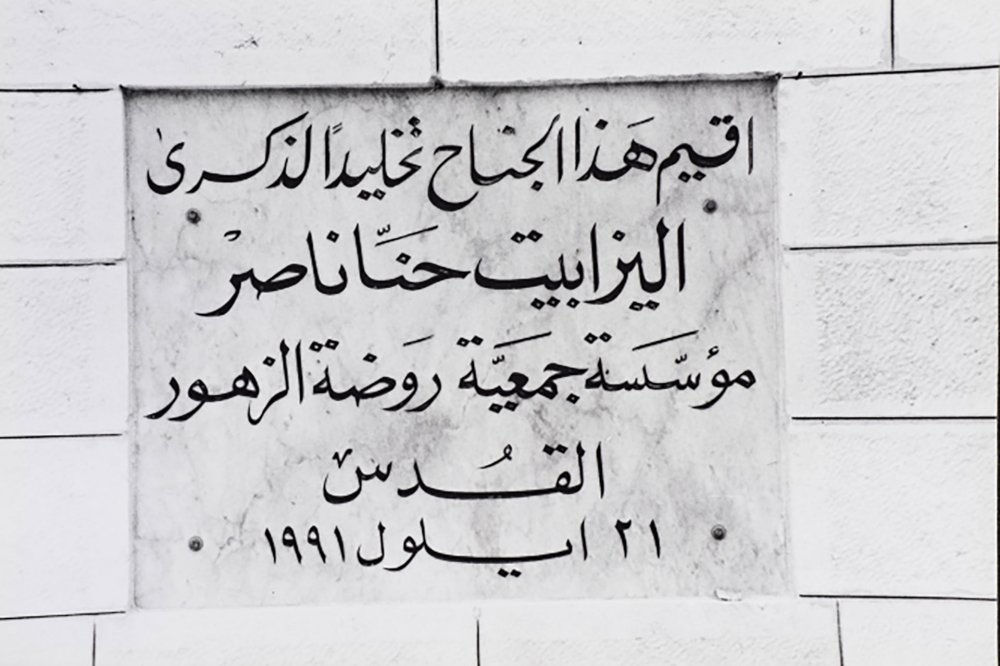Elizabeth Nasir was the founder of Jerusalem’s Rawdat El-Zuhur school, which she established in 1952. She dedicated most of her life to educating children in Jerusalem.
Beginnings
Elizabeth (“Lizzy”) Hanna Nasir, born in Nablus in 1906, was one of nine children, eight daughters and one son. Her father, Hanna Musa Nasir, was a pastor originally from the town of Birzeit. Nasir’s mother, Sa‘di Shatara, was a teacher in Ramallah before her marriage. Nasir was a twin to her sister Victoria; they remained close.
Nasir attended Jerusalem’s Saint Mary’s school for girls1 along with some of her sisters, but she was the only one of two among them to continue her schooling and pursue higher education. She graduated from the American University of Beirut in 1933 with a degree in sociology. She was one of four Jerusalemite girls to graduate from the university in the early 1900s.2 In a retrospective brochure commemorating the school’s 50th anniversary, her niece Samia Nasir Khoury wrote of Nasir:
The mere fact that she, out of all her sisters was able to persuade her father, in spite of his limited resources as a clergyman, to send her to the AUB, is an indication of how determined she was to pursue her higher education. In fact she was one of the first Palestinian women to obtain a university degree.3
Nasir began working as a teacher, first in the city of Tiberias, followed by Hebron, Jerusalem, and finally Jaffa.
During the 1948 Nakba, Nasir was compelled to flee Jaffa. She lost her home and all her belongings. She chose to go to her family home in Birzeit, her father’s native city, and was hoping to return to Jaffa soon after.4 When it became apparent that the situation would not improve, however, she decided to begin social work activities and community service while still in Birzeit. There, she also studied history at Birzeit University.5
Nasir was appointed by the Jordanian Social Welfare Ministry in the early 1950s as a social worker and later as director of the Social Welfare Department in Jerusalem, the first woman to hold such a post. This meant she was the boss in a department of mostly men, according to her niece.6
Nasir was a lively character, known for her boldness, propriety, and discipline. Her character enabled her to break many social conventions to carry out her social work.
It was a stormy day in February 1952 when Nasir, out on an inspection tour, came across two girls, aged around five and six, begging on the street in Ramallah, north of Jerusalem. They were drenched, their clothes in tatters, and standing precariously on the side of the road, begging. She later wrote:
The girls came up to me begging and when I asked them why they were doing that, they explained that they were supporting their parents who lived in a nearby village. They also told me that the taxi drivers had pity on them and gave them free lifts back to their village. My conscience pricked me and I accompanied them to their home, and to my horror, I found out that they lived in a bare hovel with torn sack cloth on the floor. The mother was blind, and the father was sick and shivering as it was bitterly cold, and with no food whatsoever around. I could not hold back my tears and I was determined to put an end to their misery and humiliation. There were hardly any orphanages at that time, so I appealed to the Judge to allow me to put the girls up temporarily in the Reformatory. I realized that the Reformatory was not the ideal place for those young girls, but at least they would have shelter and food. So I was very glad when my appeal was granted especially when the medical examination showed that those two girls had been molested and they had venereal disease.7
This scene was pivotal for Nasir, as it inspired her to establish a home in Jerusalem for destitute girls that same year, which came to be known as Rawdat El-Zuhur. She chose this name carefully, according to her niece Khoury, because “She wanted a name that would reflect the spirit of the place without putting a stigma to the background of destitution.”8 Likewise, according to Khoury, the only time she ever terminated a teacher was when a reference was made to the girls as “street girls.” She immediately ordered her to leave.9
She sought out girls by asking men in coffee shops or taxi drivers if they had seen any begging on the street and searching herself in hovels and caves. In so doing, she broke all conventions of propriety during her time.10
At her school, she taught Jerusalem’s girls to read and write, health care, home economics, tailoring, and music. She also nurtured in them a desire for an independent Palestine.11
The home that she established quickly grew into a coeducational kindergarten and then an elementary school. Nasir was able to expand the school with the help of aid and donations from generous contributors.12 However, she rejected any donations from Israeli figures or organizations to safeguard the Arab identity of her school.13
Expansion
Following the 1967 War, Nasir was determined to expand the school and further develop its programs and offerings, which up until then was functioning more as a nursery. Her aim was to fulfill Jerusalem’s need for a school that provides a national curriculum for both girls and boys during the difficult time.14
Once the school reached 250 students, Nasir began to expand. She added several extensions and a second floor to the original house that served as the girls’ home. Nasir also created a bank account that paid the rent of the new floor for the next 13 years.15 She also rented a nearby apartment to expand Rawdat El-Zuhur’s campus. Unfortunately, Nasir passed away before her new campus received its legal permit, a process which took seven years.
Beloved of Jerusalem
Known as “Lizzy” to her friends and “Mrs. Nasir” to her students, the founder of Rawdat El-Zuhur dedicated her life to teaching the sons and daughters of Jerusalem. Scholar, educator, and social activist, Nasir changed the lives of many homeless girls by providing them with an education.
Nasir retired from Rawdat El-Zuhur in 1986 at age 79 to make way for a new generation. To mark her retirement, the school put on a surprise pageant in which Nasir’s friends, colleagues, students, teachers, and board members shared what she had meant to them.16
A mere year later, on April 2, 1987, she passed away in Jerusalem. She arranged her own funeral in which she requested that those attending walk around her coffin so that she could bid farewell to her beloved Jerusalem.
Summing up Nasir’s life and legacy, her niece Khoury wrote:
This combination of love, warmth, frankness, determination and dedication is what made Lizzy Nasir a remarkable person. Her courage to stand up for what she believed in against all odds and to fight for what was right makes her unforgettable. Unlike many of her age she was willing to experiment and try new things both in the field of social work and in education. She encouraged the young people to do something worthwhile with themselves.17
Sources
al-‘Asa, ‘Aziz Mahmud, and ‘Imad ‘Afif al-Khatib. Jerusalemites Who Made Our History. [In Arabic.] Ramallah: al-Lajna al-Wataniyya li-l-Quds, 2018.
“Elizabeth Hanna Nasser.” All4Palestine. Accessed May 5, 2024.
“Elizabeth Nasir (1906–1987): Rawdat El-Zuhur School.” [In Arabic.] Rawdat.org. Accessed May 14, 2024.
“Elizabeth Nasir, Pioneer in Social Work in Jerusalem.” [In Arabic.] al-Ghad, May 12, 2019.
“History.” Rawdat.org. Accessed May 14, 2024.
“Nasser, Elizabeth (Lizzie) (1909–1988).” PASSIA. Accessed May 5, 2024.
“Palestinian Figures Who Defended Jerusalem and Fought against Zionism.” [In Arabic.] al-Manar. Accessed May 12, 2024.
[Profile photo: The Palestinian Museum Digital Archive, Item 191685]
Notes
“Elizabeth Nasir, Pioneer in Social Work in Jerusalem” [in Arabic], al-Ghad, May 12, 2019.
‘Aziz Mahmud al-‘Asa and ‘Imad ‘Afif al-Khatib, Jerusalemites Who Made Our History [in Arabic] (Ramallah: al-Lajna al-Wataniyya li-l-Quds, 2018), 14.
“Elizabeth Nasir (1906–1987): Rawdat El-Zuhur School” [in Arabic], Rawdat.org, accessed May 14, 2024, 53.
“Nasser, Elizabeth (Lizzie) (1909–1988),” PASSIA, accessed May 5, 2024.
“Palestinian Figures Who Defended Jerusalem and Fought against Zionism” [in Arabic], al-Manar, accessed May 12, 2024.
“Elizabeth Nasir (1906–1987),” 52.
“Elizabeth Nasir (1906–1987),” 50.
"Elizabeth Nasir (1906–1987),” 49.
“Elizabeth Nasir (1906–1987),” 12.
“Elizabeth Hanna Nasser,” All4Palestine, accessed May 5, 2024.
“Elizabeth Nasser, Pioneer.”
al-‘Asa and al-Khatib, Jerusalemites, 18.
al-‘Asa and al-Khatib, Jerusalemites, 17.
al-‘Asa and al-Khatib, Jerusalemites, 17.
“Elizabeth Nasir (1906–1987),” 48.
“Elizabeth Nasir (1906–1987),” 48.

